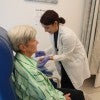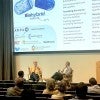
Real-time caregiving data could reshape dementia support, Rice study suggests
A Rice study — known as Project REACH — is among the first in the nation to collect real-time data on how stress affects the health and well-being of dementia caregivers.

Real-time caregiving data could reshape dementia support, Rice study suggests
A Rice study — known as Project REACH — is among the first in the nation to collect real-time data on how stress affects the health and well-being of dementia caregivers.

Innovation to impact: Richards-Kortum previews Rice360’s Innovation for Healthcare Access Conference
Ahead of the Innovation for Healthcare Access Conference hosted by Rice360, Rebecca Richards-Kortum shares insights on advancing equitable health care solutions across Texas and the United States.

Algorithm maps genetic connection between Alzheimer’s and specific neurons
Rice researchers and collaborators developed a computational tool that can help identify which specific types of cells in the body are genetically linked to complex human traits and diseases, including in forms of dementia such as Alzheimer’s and Parkinson’s.

Korde opens Rice360 Global Health Seminar Series with focus on policy and global health
Sonali Korde, the MD Anderson Visiting Fellow at Rice’s Baker Institute for Public Policy, kicked off the Rice360 Institute for Global Health Technologies Seminar Series Oct. 8 with a talk exploring the intersection of global health, foreign policy and humanitarian affairs.

Richards-Kortum elected to the National Academy of Medicine
Rice's Rebecca Richards-Kortum has been elected to the National Academy of Medicine (NAM), one of the nation’s highest honors in health and medicine. She is one of two Rice faculty who are the only Texas researchers to share membership across the national academies of medicine, science and engineering — an honor held by fewer than 35 researchers nationwide.

Digital Health Institute summit showcases Rice-Houston Methodist partnership in AI-driven medicine
The Digital Health Institute, a joint initiative of Rice University and Houston Methodist, held its inaugural summit Oct. 8 at Rice.

Rice, Houston Methodist developing soft ‘sleep cap’ to advance dementia prevention research
Rice researchers are working with physician scientists at Houston Methodist to develop a soft, wearable “sleep cap” designed to measure and improve deep sleep, a process critical for protecting the brain against dementia and related diseases.

DesRoches highlights Rice’s vision for health innovation at Greater Houston Partnership event
Rice President Reginald DesRoches emphasized the university’s ambitious, collaborative approach to transforming health and medicine during a panel discussion hosted by the Greater Houston Partnership. Joined by leaders from the Cancer Prevention and Research Institute of Texas and Harris Health, DesRoches outlined Rice’s vision for becoming a world leader in health innovation — a key component of the university’s strategic plan.

New AI tool makes medical imaging process 90% more efficient
Rice researchers developed an AI tool that makes a medical imaging process 90% more efficient.

Rice's Ken Kennedy Institute hosted the fourth annual AI in Health Conference, convening over 550 attendees across the four-day event for plenary speaker sessions, networking and workshops that explored key areas for artificial intelligence-driven advancement across health and public health domains.

Rice hosts ARPA-H summit on future of implantable biohybrid devices
Rice hosted the second Advanced Research Projects Agency for Health Biohybrid Devices Summit Sept. 25-26 in Houston to support research and translation in implantable devices that function as “living pharmacies.”

New UTHealth Houston school highlighted at joint Rice-UTHealth workshop on AI and behavioral health
The Future of AI and Behavioral Health Workshop, a joint effort of Rice and UTHealth Houston, explored the intersection of artificial intelligence and behavioral health and served to spotlight the launch of UTHealth Houston’s new School of Behavioral Health Sciences.

One year in, Momentous strategic plan accelerates Rice’s path toward bold future
One year after launching its ambitious 10-year strategic plan, Momentous: Personalized Scale for Global Impact, Rice is already seeing the transformative results of its bold vision.

Reimagining health: A transatlantic conversation on digital care, ethics, equity
Bringing together scholars across disciplines and national contexts, the event explored how emerging technologies affect reproductive health, ethical practice and the meaning of care itself.

Q&A: How Rice and Houston Methodist are building the future of digital health
Ahead of the Houston Methodist-Rice University Digital Health Institute Summit Oct.8, Rice News spoke with institute leadership about the institute’s vision, its distinctive assets and the opportunities it opens for the future of health care.